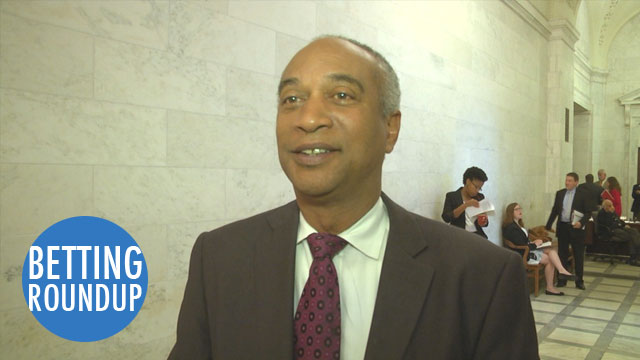Twice weekly, we’ll comb through as many articles, tweets and podcasts as we can find related to the world of sports betting and daily fantasy sports, and publish the good stuff here.
Stumble upon something you think we should include? Email info@bettingtalk.com.
* * *
New York Assemblyman J. Gary Pretlow said he plans to introduce sports betting legislation in 2017.
N.Y Assemblyman @JGPretlow plans to introduce sports betting legislation in 2017. Hopes to create circuit split, force Congress to act.
— David Payne Purdum (@DavidPurdum) August 15, 2016
A Forbes contributor suggests he’s going about it in the wrong way.
However, Assemblyman Pretlow’s approach seems misguided in light of both existing federal law and the underlying legal climate.
First, it would be rather naive to think that it would be easy to convince the New York state legislature to sign a bill legalizing sports gambling. Indeed, New York State has a long, unequivocal history of disallowing traditional sports betting. This longstanding position lies in stark contrast with the historic legal status of interactive fantasy sports, which, even before New York’s passing of new law, was somewhat murky.
A couple articles were published earlier this week breaking down what may have went wrong in New Jersey’s pursuit for legalizing sports betting.
Gambling Insider – Has New Jersey been going about the sports-betting issue the wrong way?
All of this confusion leads to one question: Why doesn’t New Jersey attempt to go the way of online gambling and ask for legislation to bypass PASPA entirely?
This would be comparable to the 2011 Department of Justice Wire Act, which in a sense went over the 2006 Unlawful Internet Gambling Enforcement Act’s head and allowed for intrastate online gambling, which New Jersey duly followed up on, as it opened a regulated market in November 2013. With regards to sports betting, this may be New Jersey’s best hope. Lesniak has said he is open to testing the temperature on repealing all sports-betting laws.
Legal Sports Report – The Problem’s With The New Jersey Sports Betting Decision, And NJ’s Next Steps
In my view, the court made a decision based more on policy than the law, the policy being that it is better for the federal government to regulate legal sports betting than the states.
While the policy may be sound, it makes for bad law. I will discuss below why the decision was legally problematic and what NJ’s options may be going forward.
DraftKings and FanDuel have proposed a bill in Nevada to regulate daily fantasy sports.
The bill, which calls for consumer protections and a $10,000 licensing fee for DFS operators, hasn’t yet been introduced in the the Nevada legislature, which doesn’t reconvene until next year.
DraftKings announced enhancements to protecting its consumers earlier this week. The site also launched a private version of its site for friends to challenge each other.
“We’ve created a private version of our site for people and their friends,” DraftKings co-founder Paul Liberman said. “It’s your customized version of DraftKings.”
Liberman said the features weren’t designed to attract traditional season-long leagues. Rather, after receiving consistent feedback from customers wanting an easier way to play against friends, Liberman’s team set out to create the platform, while injecting some of the popular social aspects of season-long leagues into DraftKings’ version of the game.
Hartley Henderson wrote that New York’s DFS legislation has opened the floodgates for the game to be regulated across the country.
But make no mistake, that is just the beginning.
Maine has recently indicated they will be introducing legislation to allow DFS even though nothing was on the table prior to New York’s bill and industry insiders have told me that Pennsylvania, New Jersey, California and Connecticut will pass legislation to legalize DFS “any time now.” And of course Colorado, Indiana, Kansas, Maryland, Mississippi, Missouri, Tennessee and Virginia have already legalized the product. Rhode Island and West Virginia haven’t actually legalized the product, but an opinion was passed by each state’s Attorney Generals that it was not illegal thereby allowing the product. It seems just a matter of time before those states pass legislation that actually legalizes and taxes DFS. Some states have licensing fees but it seems inevitable that all of them will get in line with New York and impose a licensing fee and a gross revenue tax if they haven’t already done so.
